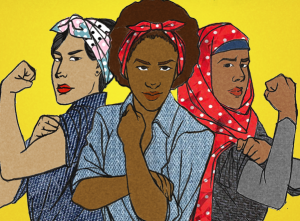
Source: Covington Travel
My identity is multi-faceted and intersectional, and I suspect that most of you reading this feel the same way.
But as a foreign-born, woman of color feminist in the United States, it can be hard to find the group within feminism that feels just right for me.
I am a foreign-born Latina feminist who is all about STEM advocacy, so I fit into a lot of categories all at the same time.
The terms intersectional, Latina, Afro-Indigenous, Black, STEM-inist, and women of color all make my heart race with excitement. I feel at home within all those circles — and, simultaneously, foreign.
For this reason, I adopted transnational feminism as an identifier and way of life. Rather than negate my other identities, it complements them.
So What Exactly Is Transnational Feminism?
Transnational feminists examine issues from a global perspective while considering how they intersect with our lived experiences in the United States.
We focus on intersections across nationality (including race and ethnicity), sex, gender, and class within the context of modern day imperialism and colonialism.
Most people think imperialism and colonialism are terms of the past, of history, but we use these terms often in transnational feminist thought because we live with the effects of them.
As feminists, it’s important to understand the various historical happenings that led to the way our modern world is shaped.
The violent acquisition of countries with Black and Brown populations by powerful empires — which were mostly European — led to the exploitation of our resources and subjugation of our people. For some of us, that means the loss of culture, language, and heritage.
To many, the beginning was the famous voyage by Christopher Columbus in 1492, but to legions of others, it started earlier and has continued for much longer (see Africa and the Middle East).
Western feminism, which is largely based on liberal thought, overemphasizes gender roles as the sole reason for women’s oppression.
By working within the structures of mainstream society, liberal feminists aim to gain political and social gains by integrating women into powerful positions, thus assimilating into patriarchal and Eurocentric standards of leadership and equity.
It’s understandable why this is a feminist thought that appeals to white women in developed nations (who don’t have to deal with the intersecting oppressions of colonialism and imperialism), but this sort of feminism does not consider the ways in which women of color are oppressed along racial and class lines.
Furthermore, non-Western women are often painted as oppressed and lacking agency. This is evident in the way in which mainstream media shows veiled women to imply a lack of freedom, meanwhile ignoring that covering the face can be an act of defiance for political representations, such as in the case of the Zapatistas.
We are consolidated into a homogeneous group without any historical, political, or geographical context.
Groups such as the Zapatistas, Women Living Under Muslim Laws, and AF3IRM paint a different story of so-called “third world women.” These organizations employ direct revolutionary action and raise consciousness to help women in their current lifestyle, while also fighting the political issues that oppress them.
This is unlike Western feminist campaigning.
While Western feminism overemphasizes commonalities with women across nations, transnational feminism recognizes inequalities across different groups of women, so that in essence, it’s a series of feminisms addressing particular issues and not one uniform movement.
This is a crucial aspect of feminism for transnational women of color because although we all might identify as women, the ways in which global issues affects us is not always the same.
And more importantly, our positions of privilege and/or disenfranchisement can change depending on our geographical location.
These differences are crucial to forming a solidarity within feminism that does not erase the lived experiences of marginalized groups. For this reason, transnational feminists always consider the global impact of the issues for which they advocate.
One way they do so is in the fight to end the hyper-militarization of our society.
In the United States, one way in which (primarily) men of color can achieve financial independence and economic advancement is by joining the military.
Yet supporting the military also means turning our backs on people (who are primarily women) in the Philippines, Afghanistan, Iraq, and many other countries, who live under American and/or European military violence.
One can’t have solidarity with nations living under US military occupation while simultaneously promoting the power structures that allow this to happen.
For this reason, transnational feminists aim to end social constructs that pit people of color against their own for imperialist motives disguised as liberation.
We see liberation as something that must come from within our own communities and nations — not something that is bestowed on us by people in power.
(Note: Read this essay by Iraqi writer Nadje Al-Ali, as she discusses the gender violence incurred by US imperialism within the context of the gender violence Iraqi women also experience at the hands of their own nation.)
How Do We Promote the Success of People of Color in the US and Dismantle Oppressive Regimes Worldwide?
Transnational feminist organizations provide people of color with alternative resources so they don’t feel that joining the military is the only choice for economic success.
Transnational feminists also question the types of advocacy that liberal, Western feminist practice to promote the sexual liberation of women.
This is not to suggest that transnational feminists do not believe in women’s sexual autonomy, but rather that we consider the context in which our bodies are being asked to be displayed and for what purpose.
Sexual liberation is a shared issue among all feminists. Whether we hold traditional values or otherwise, we all firmly believe that our bodies are primarily ours and we should be able to do with them as we desire.
But unlike common Western sexual liberation advocacy, transnational women of color see sexual liberation as more than freely displaying our bodies; it’s also about practicing our respective religions, customs, and ideologies safely and without threat of harassment or discrimination.
Further, when the majority of victims of sexual trafficking are women of color living under vulnerable circumstances, one must question the bias and privilege one must have to organize movements that depict sexual liberation with casual sex, nudity, and the reclamation of words that continue to harm and marginalize us — such as “slut.”
Transnational feminists feel that before we ask women of color to participate in campaigns such as Slut Walk and FEMEN’s naked advocacy, we need to address the ways in which so many of them are sexually exploited.
Women of color are criminalized for being “sluts” under racist laws that vilify sex workers, as in the case of New Orleans. For women who are constantly reduced to sex objects, it’s not always empowering to call ourselves sluts.
And although organizations like FEMEN can help denounce such slut shaming, they spend considerable time asking women to uncover (rather than welcoming foreign born women of color into leadership positions to help generate more inclusive strategies for the movement).
Sex tourism and militarized prostitution overwhelming occur in developing countries, especially those that have a history of colonialism.
If the inequalities that were set in place during American and European colonialist history of genocide and slavery are not dismantled, they will continue to affect individuals along ethnic and racial lines, which is then compounded by sexism.
Transnational feminists feel that in order to attain true sexual agency, we must first dismantle the systems that make sexual exploitation a daily experience for many women worldwide.
For example, instead of telling women to unveil or wear miniskirts to show us how sexually liberated they are, we should be supporting them in all their choices — regardless of whether that does or does not include sexualized clothing or behavior — and fight to end social constructs that allow women to be labeled based on their attire.
Domestic workers rights and immigration rights are also at the forefront of transnational feminist activism.
Transnational women of color living in the United States represent the largest number of domestic workers: 46% of them are foreign-born, and 35% are non-citizens.
And while Western feminism has acknowledged that domestic worker protections are a feminist issue, many fail to make a connection between immigration reform, worker’s rights, and gender violence throughout the world. It’s all about race and class inequalities, and one cannot be fixed without the other.
Transnational feminist organizations ensure that the needs of those marginalized within minority groups are also being met. This is the case for the Sylvia Rivera Law Project, who provide legal services to trans immigrants.
It is important to support immigrant communities, but also fighting to stop the US capitalist endeavors in developing countries that make immigration a necessity and not a choice.
***
To be feminist is to be anti-capitalist, anti-imperialist, and anti-patriarchal because these systems function together to create inequality and maintain the status quo.
As an American, I care deeply about US policies and how they affect women in this country.
But as a Dominican Latina, my mind is always on the plight of women in my homeland and other Latin American countries.
As a foreign-born woman, I consider the way that global issues affect marginalized women in other parts of the world. And as a foreign language speaker, I wonder how my activism and writing translates to those that need it the most.
My feminism transcends borders because my identity does.
I am transnational. For my feminism to have an impact, I must fight the countries that put up the borders; otherwise, there will never be an end to systemic oppression.
[do_widget id=”text-101″]
Patricia Valoy is a Contributing Writer for Everyday Feminism. She is a Civil Engineer, feminist blogger, and STEM activist living in New York City. She writes about feminist and STEM issues from the perspective of a Latina and a woman in engineering. You can read more of her writings on her blog Womanisms, or follow her on Twitter @besito86. Read her articles here and book her for speaking engagements here.
Search our 3000+ articles!
Read our articles about:
Our online racial justice training
Used by hundreds of universities, non-profits, and businesses.
Click to learn more
Most Read Articles
- « Previous
- 1
- …
- 30
- 31
- 32



















